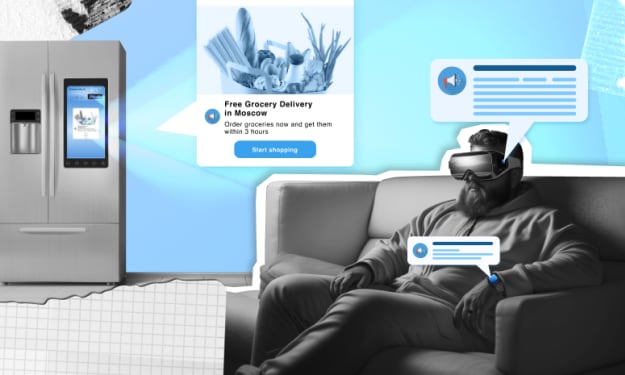Facebook Meta: The Future of Social Media?
Exploring the Implications and Possibilities of Facebook's Rebranding to Meta and its Vision for the Metaverse

On October 28, 2021, Facebook announced its rebranding to "Meta" and a new vision for the future of social media, centered around the concept of the "metaverse". The metaverse is essentially a virtual world where users can interact with each other and digital objects in a fully immersive environment. With this bold move, Facebook aims to position itself as a leader in the development of this new frontier in technology. In this article, we will explore the implications and possibilities of Facebook's transition to Meta and its vision for the metaverse.
The Birth of Meta
The rebranding to Meta is not just a name change for Facebook. It represents a fundamental shift in the company's direction and mission. According to Facebook CEO Mark Zuckerberg, the metaverse is the "next generation of the internet" and a natural progression from the current era of social media. In Zuckerberg's view, the metaverse is the future of human interaction, and Facebook intends to lead the way in its development.
The concept of the metaverse is not a new one. Science fiction authors have been exploring the idea of virtual worlds for decades, and video games have been offering virtual experiences for years. However, the metaverse that Facebook envisions goes beyond just a virtual world. It is a fully immersive environment where users can engage with each other and digital objects in real-time. Zuckerberg describes it as "an embodied internet, where instead of just viewing content, you are in it."
Implications for Social Media
The move to Meta has significant implications for social media as we know it. While Facebook's core social media platform will remain, the company's focus will shift towards building the metaverse. This means that the way we interact with social media and each other could be vastly different in the future.
For one, the metaverse will likely require new hardware and software to fully immerse users in the experience. Facebook has already announced the development of its own virtual reality (VR) headset, the Oculus, which will be a key component in accessing the metaverse. This means that social media could become even more of a niche market, as only those with the necessary hardware and software will be able to fully participate in the metaverse.
Another implication is that the metaverse will require a new set of rules and regulations. Unlike the current era of social media, the metaverse will be a fully immersive environment where users can interact with each other and digital objects in real-time. This means that issues like privacy, security, and content moderation will become even more important in the metaverse. Facebook has already stated that it will be taking a "privacy first" approach to the metaverse, but it remains to be seen how effective this will be in practice.
The Possibilities of the Metaverse
Despite these challenges, the metaverse offers a world of possibilities for social media and beyond. The fully immersive environment of the metaverse opens up new avenues for creativity, entertainment, and commerce. For example, businesses could use the metaverse to create fully immersive shopping experiences for their customers. Users could attend concerts, sporting events, and other live performances in the metaverse, regardless of their physical location.
The metaverse also offers the potential for greater social connection and community-building. In the current era of social media, we often interact with others in a disconnected and superficial way. The metaverse could provide a more authentic and meaningful way to connect with others, regardless of physical distance.
Finally, the metaverse could offer new solutions to some of the world's most pressing problems. For example, the metaverse could be used to create virtual classrooms, where students
can attend lectures and interact with teachers and fellow students in real-time, regardless of their physical location. This could potentially revolutionize education and make it more accessible to those who are unable to attend traditional classrooms.
Similarly, the metaverse could be used to create virtual healthcare experiences. Patients could meet with doctors and healthcare professionals in a fully immersive environment, allowing for more accurate diagnoses and personalized treatment plans. This could be especially beneficial for those who live in remote areas or have limited access to healthcare facilities.
The metaverse could also have implications for environmental sustainability. As more people turn to virtual experiences, there may be a reduction in the need for physical transportation and infrastructure, which could lead to a decrease in carbon emissions.
Challenges and Concerns
While the possibilities of the metaverse are exciting, there are also concerns about the potential negative consequences. One major concern is that the metaverse could further exacerbate existing inequalities. Access to the metaverse will likely require expensive hardware and software, which could create a digital divide between those who can afford to participate and those who cannot. Additionally, issues like privacy and content moderation will be even more challenging in the metaverse, which could lead to exploitation and harm.
There are also concerns about the potential for addiction and the blurring of the lines between the virtual and physical worlds. If the metaverse becomes the dominant form of social interaction, it could further isolate individuals from real-world social connections and lead to a decrease in mental health and well-being.
Conclusion
The transition to Meta represents a bold move for Facebook, with implications for social media and beyond. The metaverse offers a world of possibilities for creativity, entertainment, and social connection. It could also offer new solutions to some of the world's most pressing problems, from education to healthcare to environmental sustainability.
However, the metaverse also presents significant challenges and concerns, including issues around access, privacy, and addiction. As the development of the metaverse moves forward, it will be important to carefully consider these implications and work towards creating a metaverse that is equitable, safe, and beneficial for all.In addition to the challenges and concerns mentioned above, the development of the metaverse raises important questions about the role of corporations in shaping the future of digital spaces. As Facebook moves forward with its plans to create the metaverse, it will have significant power to shape the rules, norms, and values of this new digital world. This raises concerns about the potential for corporate interests to dominate the development of the metaverse, and for the values and goals of Facebook to shape the broader digital landscape.
Moreover, the development of the metaverse will have important implications for the future of work. As more jobs become automated and remote, the metaverse could provide new opportunities for work and collaboration. For example, virtual meetings and conferences could become more immersive and interactive, allowing for more productive and engaging discussions. However, the metaverse could also lead to new forms of exploitation and precarity, with workers increasingly expected to be available and productive at all times, even in virtual spaces.
Finally, the development of the metaverse raises important questions about the future of human identity and experience. As more aspects of our lives move online, our sense of self and community may become increasingly tied to digital spaces. This could lead to a further erosion of our sense of privacy and autonomy, and a blurring of the lines between our physical and digital selves.
Overall, the development of the metaverse represents a major shift in the way we think about digital spaces and our interactions with technology. While the possibilities of the metaverse are exciting, it will be important to carefully consider the challenges and concerns it presents, and to work towards creating a metaverse that is equitable, safe, and beneficial for all.
About the Creator
Muhammad Hamza
I'm Hamza, Passionate writer on personal growth, wellness, and technology. Providing compelling insights and thought-provoking content for an exciting journey of discovery.Join me on this exciting journey of exploration and discovery.






Comments
There are no comments for this story
Be the first to respond and start the conversation.